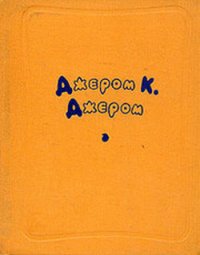Three Men on the Bummel - Jerome Jerome Klapka (лучшие бесплатные книги .TXT) 📗
"Our water-cart may have its disadvantages," continued George, "but it can only make you uncomfortable about the legs, and you can avoid it. This is the sort of machine with which a man can follow you round the corner and upstairs."
"It fascinates me to watch them," said Harris. "They are so skilful. I have seen a man from the corner of a crowded square in Strassburg cover every inch of ground, and not so much as wet an apron string. It is marvellous how they judge their distance. They will send the water up to your toes, and then bring it over your head so that it falls around your heels. They can-"
"Ease up a minute," said George. I said: "Why?"
He said: "I am going to get off and watch the rest of this show from behind a tree. There may be great performers in this line, as Harris says; this particular artist appears to me to lack something. He has just soused a dog, and now he's busy watering a sign-post. I am going to wait till he has finished."
"Nonsense," said Harris; "he won't wet you."
"That is precisely what I am going to make sure of," answered George, saying which he jumped off, and, taking up a position behind a remarkably fine elm, pulled out and commenced filling his pipe.
I did not care to take the tandem on by myself, so I stepped off and joined him, leaving the machine against a tree. Harris shouted something or other about our being a disgrace to the land that gave us birth, and rode on.
The next moment I heard a woman's cry of distress. Glancing round the stem of the tree, I perceived that it proceeded from the young and elegant lady before mentioned, whom, in our interest concerning the road-waterer, we had forgotten. She was riding her machine steadily and straightly through a drenching shower of water from the hose. She appeared to be too paralysed either to get off or turn her wheel aside. Every instant she was becoming wetter, while the man with the hose, who was either drunk or blind, continued to pour water upon her with utter indifference. A dozen voices yelled imprecations upon him, but he took no heed whatever.
Harris, his fatherly nature stirred to its depths, did at this point what, under the circumstances, was quite the right and proper thing to do. Had he acted throughout with the same coolness and judgment he then displayed, he would have emerged from that incident the hero of the hour, instead of, as happened, riding away followed by insult and threat. Without a moment's hesitation he spurted at the man, sprang to the ground, and, seizing the hose by the nozzle, attempted to wrest it away.
What he ought to have done, what any man retaining his common sense would have done the moment he got his hands upon the thing, was to turn off the tap. Then he might have played foot-ball with the man, or battledore and shuttlecock as he pleased; and the twenty or thirty people who had rushed forward to assist would have only applauded. His idea, however, as he explained to us afterwards, was to take away the hose from the man, and, for punishment, turn it upon the fool himself. The waterman's idea appeared to be the same, namely, to retain the hose as a weapon with which to soak Harris. Of course, the result was that, between them, they soused every dead and living thing within fifty yards, except themselves. One furious man, too drenched to care what more happened to him, leapt into the arena and also took a hand. The three among them proceeded to sweep the compass with that hose. They pointed it to heaven, and the water descended upon the people in the form of an equinoctial storm. They pointed it downwards, and sent the water in rushing streams that took people off their feet, or caught them about the waist line, and doubled them up.
Not one of them would loosen his grip upon the hose, not one of them thought to turn the water off. You might have concluded they were struggling with some primeval force of nature. In forty-five seconds, so George said, who was timing it, they had swept that circus bare of every living thing except one dog, who, dripping like a water nymph, rolled over by the force of water, now on this side, now on that, still gallantly staggered again and again to its feet to bark defiance at what it evidently regarded as the powers of hell let loose.
Men and women left their machines upon the ground, and flew into the woods. From behind every tree of importance peeped out wet, angry heads.
At last, there arrived upon the scene one man of sense. Braving all things, he crept to the hydrant, where still stood the iron key, and screwed it down. And then from forty trees began to creep more or less soaked human beings, each one with something to say.
At first I fell to wondering whether a stretcher or a clothes basket would be the more useful for the conveyance of Harris's remains back to the hotel. I consider that George's promptness on that occasion saved Harris's life. Being dry, and therefore able to run quicker, he was there before the crowd. Harris was for explaining things, but George cut him short.
"You get on that," said George, handing him his bicycle, "and go. They don't know we belong to you, and you may trust us implicitly not to reveal the secret. We'll hang about behind, and get in their way. Ride zig-zag in case they shoot."
I wish this book to be a strict record of fact, unmarred by exaggeration, and therefore I have shown my description of this incident to Harris, lest anything beyond bald narrative may have crept into it. Harris maintains it is exaggerated, but admits that one or two people may have been "sprinkled." I have offered to turn a street hose on him at a distance of five-and-twenty yards, and take his opinion afterwards, as to whether "sprinkled" is the adequate term, but he has declined the test. Again, he insists there could not have been more than half a dozen people, at the outside, involved in the catastrophe, that forty is a ridiculous misstatement. I have offered to return with him to Hanover and make strict inquiry into the matter, and this offer he has likewise declined. Under these circumstances, I maintain that mine is a true and restrained narrative of an event that is, by a certain number of Hanoverians, remembered with bitterness unto this very day.
We left Hanover that same evening, and arrived at Berlin in time for supper and an evening stroll. Berlin is a disappointing town; its centre over-crowded, its outlying parts lifeless; its one famous street, Unter den Linden, an attempt to combine Oxford Street with the Champs Elysee, singularly unimposing, being much too wide for its size; its theatres dainty and charming, where acting is considered of more importance than scenery or dress, where long runs are unknown, successful pieces being played again and again, but never consecutively, so that for a week running you may go to the same Berlin theatre, and see a fresh play every night; its opera house unworthy of it; its two music halls, with an unnecessary suggestion of vulgarity and commonness about them, ill— arranged and much too large for comfort. In the Berlin cafes and restaurants, the busy time is from midnight on till three. Yet most of the people who frequent them are up again at seven. Either the Berliner has solved the great problem of modern life, how to do without sleep, or, with Carlyle, he must be looking forward to eternity.
Personally, I know of no other town where such late hours are the vogue, except St. Petersburg. But your St. Petersburger does not get up early in the morning. At St. Petersburg, the music halls, which it is the fashionable thing to attend AFTER the theatre-a drive to them taking half an hour in a swift sleigh-do not practically begin till twelve. Through the Neva at four o'clock in the morning you have to literally push your way; and the favourite trains for travellers are those starting about five o'clock in the morning. These trains save the Russian the trouble of getting up early. He wishes his friends "Good-night," and drives down to the station comfortably after supper, without putting the house to any inconvenience.




